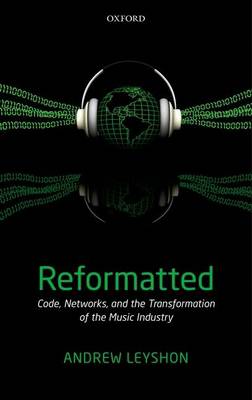
Bedankt voor het vertrouwen het afgelopen jaar! Om jou te bedanken bieden we GRATIS verzending aan op alles gedurende de hele maand januari.
- Afhalen na 1 uur in een winkel met voorraad
- Gratis thuislevering in België
- Ruim aanbod met 7 miljoen producten
Bedankt voor het vertrouwen het afgelopen jaar! Om jou te bedanken bieden we GRATIS verzending aan op alles gedurende de hele maand januari.
- Afhalen na 1 uur in een winkel met voorraad
- Gratis thuislevering in België
- Ruim aanbod met 7 miljoen producten
Zoeken
Reformatted
Code, Networks, and the Transformation of the Music Industry
Andrew Leyshon
Hardcover | Engels
€ 149,95
+ 299 punten
Omschrijving
The impact of digital technology on the musical economy has been profound. From its production, reproduction, distribution, and consumption, the advent of MP3 and the use of the Internet as a medium of distribution has brought about a significant transformation in the way that music is made, how it is purchased and listened to, and, significantly, how the musical economy itself is able to reproduce itself. In the late 1990s the obscure practice of 'ripping' tracks from CDs through the use of compression programmes was transformed from the illegal hobby of a few thousand computer specialists to a practice available to millions of people worldwide through the development of peer-to-peer computer networks. This continues to have important implications for the viability of the musical economy. At the same time, the production of music has become more accessible and the role of key gatekeepers in the industry--such as record companies and recording studios-- has been undermined, whilst the increased accessibility of music at reduced cost via the Internet has revalorised live performance, and now generates revenues higher than recorded music. The early 21st century has provided an extraordinary case study of an industry in flux, and one that throws light on the relationship between culture and economy, between passion and calculation. This book provides a theoretically grounded account of the
implications of digital technology on the musical economy, and develops the concept of the musical network to understand the transformation of this economy over space and through time.
implications of digital technology on the musical economy, and develops the concept of the musical network to understand the transformation of this economy over space and through time.
Specificaties
Betrokkenen
- Auteur(s):
- Uitgeverij:
Inhoud
- Aantal bladzijden:
- 240
- Taal:
- Engels
Eigenschappen
- Productcode (EAN):
- 9780199572410
- Verschijningsdatum:
- 26/08/2014
- Uitvoering:
- Hardcover
- Formaat:
- Genaaid
- Afmetingen:
- 218 mm x 145 mm
- Gewicht:
- 408 g

Alleen bij Standaard Boekhandel
+ 299 punten op je klantenkaart van Standaard Boekhandel
Beoordelingen
We publiceren alleen reviews die voldoen aan de voorwaarden voor reviews. Bekijk onze voorwaarden voor reviews.












